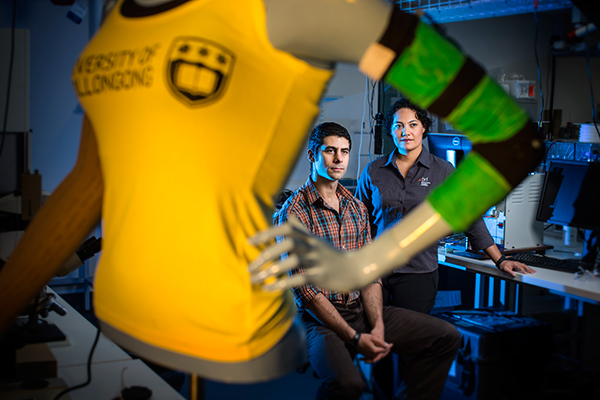December 12, 2014
Prestigious fellowship to fast track breast cancer sleeve
An innovative new device to relieve the symptoms of breast cancer-related lymphoedema is under development.

Dr Sheridan Gho (right) and Mr Michael Weaver with their innovative 'Lymph Sleeve' prototype.
An innovative new device to relieve the symptoms of breast cancer-related lymphoedema is under development at UOW.
The ‘Lymph Sleeve’, made from intelligent fabric, gives hope to the one in three breast cancer patients who develop lymphoedema, a painful and incurable condition that causes swelling of the arm due to the build-up of lymphatic fluids.
The device is now one step closer to reality after its inventors, Dr Sheridan Gho and Mr Michael Weaver, won a prestigious fellowship that will see them work with some of the world’s foremost medical innovation experts to commercialise the prototype.
The Hon Jillian Skinner MP, NSW Minister for Health and Minister for Medical Research, announced Dr Gho and Mr Weaver were the winners of the NSW-QB3 Rosenman Institute Fellowship at recent a ceremony in Sydney (Tuesday 9 December).
The ceremony marked the conclusion of the 12 week intensive NSW Medical Devices Commercialisation Training Program, delivered by ATP Innovations, a world-leading business incubator. Twenty of the best medical device researchers in NSW participated in the program, which aimed to close the gap between research innovations and product delivery into the market.
Dr Gho, from UOW’s Biomechanics Research Laboratory, said lymphoedema, which can occur when lymph nodes are damaged or removed, creates significant discomfort for those already experiencing the effects of cancer.
“Lymphoedema is currently treated with manual massage, which requires the patient to visit a trained lymphatic massage therapist, and compression garments that are difficult to put on, hot in summer and can cause rashes and other skin problems,” Dr Gho said.
“The Lymph Sleeve aims to help solve some of these problems. It has been developed using lightweight smart fabric that will detect swelling and then respond by ‘massaging’ the arm to enhance lymph flow.”
Mr Weaver, an Associate Research Fellow and PhD student from UOW’s Centre for Medical Radiation Physics, explained the impact the device can create.
“This device has the potential to help millions of women suffering from lymphoedema around the world. It also has the potential to help manage the symptoms of other diseases such as congenital oedema, circulatory diseases and diabetes.”
Vice-Chancellor Professor Paul Wellings said the fellowship is “a wonderful reflection on the quality of the research and knowledge exchange activities at UOW.”
The Lymph Sleeve, which won a National Breast Cancer Foundation Concept Award in 2011, is a collaboration between the UOW’s Biomechanics Research Laboratory, Global Challenges, the Centre for Medical Radiation Physics, Australian Research Council Centre of Excellence for Electromaterials Science and Illawarra Health and Medical Research Institute.
The project has also been supported in the community by the Illawarra Cancer Carers Lymphoedema Support Group, and the Illawarra Lymphoedema Service, with both patients and clinicians enthusiastically sharing their experiences to help improve the device.
The Lymph Sleeve is just one of many real-world applications for the smart fabric that UOW researchers are developing. The fabric, made from a strong and flexible yarn that conducts and stores electricity, is already powering a world-first Bionic Bra prototype and could be used in many other wearable medical devices and smart clothes.
Media contact: Elise Pitt, Media & PR Officer, UOW, +61 2 4221 3079, +61 422 959 953 or epitt@uow.edu.au.